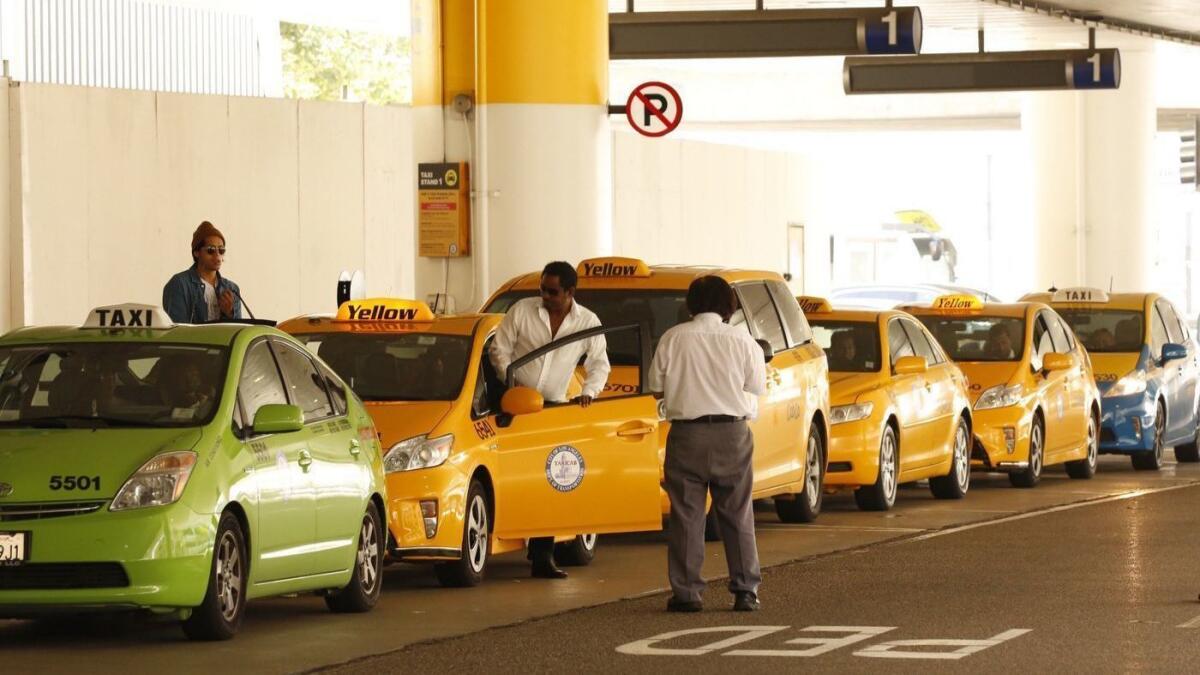Op-Ed: L.A.’s taxi industry discriminates against black riders. If we don’t force them to change, they won’t

- Share via
Since Uber and Lyft arrived in Los Angeles in 2012, taxi trips have fallen by more than 30%. In 2016, Lyft alone completed four times more trips than all L.A. taxis combined. Riders appear to overwhelmingly prefer new ride-hailing services to taxis. Is this just a matter of technological convenience, or is something else at play?
One possible factor: Racial discrimination in the taxi industry.
Last fall, I conducted L.A.’s first “equity audit” of ride-hailing and taxi services to compare wait times and trip cancellation rates by race and ethnicity. I hired UCLA students to take more than 1,700 rides in Lyfts, Ubers and taxis between two designated spots along the Expo Line, an unusually large sample for this kind of study. I found that when it comes to timeliness, technology and — most troublingly — racial discrimination, taxis lag significantly behind their flashy new competitors.
Problems with the current model of taxi hailing begin at dispatch. Taxis apps were virtually unusable: they double-charged riders, directed drivers to the wrong locations or failed to connect riders and drivers altogether. Students called taxi dispatchers instead, but the service wasn’t much better.
Taxi companies were 73% more likely to not pick up a black customer than a white customer.
One out of five taxi riders were not picked up at all. Those who were picked up waited an average of 24 minutes, compared to fewer than six minutes for Lyft and Uber. Ten percent of taxi riders in my study waited more than an hour.
But taxi service, while poor, was pretty much the same for white, Asian and Latino riders. It was only noticeably different — and noticeably worse — for black riders, providing robust evidence of discrimination. Taxi companies were 73% more likely to not pick up a black customer than a white customer, and one in four black riders never reached their destination. When they were picked up, black riders waited 52% longer than white riders.
Previous researchers have found that taxis avoid low-income neighborhoods and communities of color. Because my study followed riders traveling between two identical locations, we can see that discrimination also occurs at the individual level, driven primarily by race.
Discrimination occurs when a driver (or taxi dispatcher) first infer a rider’s race: When they see a rider’s picture (on Lyft), learn their name, or approach a rider for pickup.
In several cases, taxi drivers approached black riders, but then drove off without stopping; other times, drivers refused to transport a black rider without receiving a cash fare up front, which is illegal.
Lyft and Uber didn’t eliminate the racial differences in service, but they came close. On both services, a black rider had about a 4% higher likelihood of having a trip canceled than a white rider. But while unlawful discrimination by taxis prevented over one-quarter of black riders from completing their trip, almost all Lyft and Uber users — 99.7% — reached their destination even if their first driver canceled.
With ride-hailing services, mobility may be delayed on the basis of race, but it isn’t denied.
Click here for the full Livable City archive »
Additionally, when a Lyft or Uber rider is canceled on and perhaps discriminated against, they can easily report the driver to the company using the app. Other changes — such as tracking driver cancellation behavior, permitting riders to use pseudonyms, and delaying when drivers learn a rider’s name (as names can signify race) or see their photo — could help erase the racial gap almost entirely.
Reforming taxi service is a much bigger task. Given the study’s findings, it could be tempting for policymakers and consumers to write off taxis as a thing of the past. But Lyft and Uber are still inaccessible to those without bank cards or smartphones. As long as taxis fill the role of on-demand, cash travel, their customers must be treated fairly.
The Los Angeles Taxicab Commission urges riders who experience a cancellation, illegal payment request or other abuse to report the issue to the taxi company. But filing complaints with a taxi company is challenging, at best. One study rider, who attempted to file a complaint with a taxi company, was told to call back later and her complaint was never logged. Even were riders to reach customer service, without reliable apps, it’s not easy for riders to get the specific cab number or driver name, or verify where and when the abuse took place. The city only records around 220 taxi complaints per year. My study shows there is clearly a lot more to complain about.
Los Angeles needs a better system for reporting discrimination and other taxi problems. And the onus of policing discrimination shouldn’t fall on riders alone: The Taxi Commission should conduct its own tests, and the city should audit complaint records to determine the worst offenders and to enforce its anti-discrimination laws. Unless taxi companies are forced to change, it’s hard to see how rider equity will improve.
Anne E. Brown is a researcher at the UCLA Institute of Transportation Studies and an incoming assistant professor of planning, public policy and management at the University of Oregon.
Follow the Opinion section on Twitter @latimesopinion or Facebook.
More to Read
A cure for the common opinion
Get thought-provoking perspectives with our weekly newsletter.
You may occasionally receive promotional content from the Los Angeles Times.






